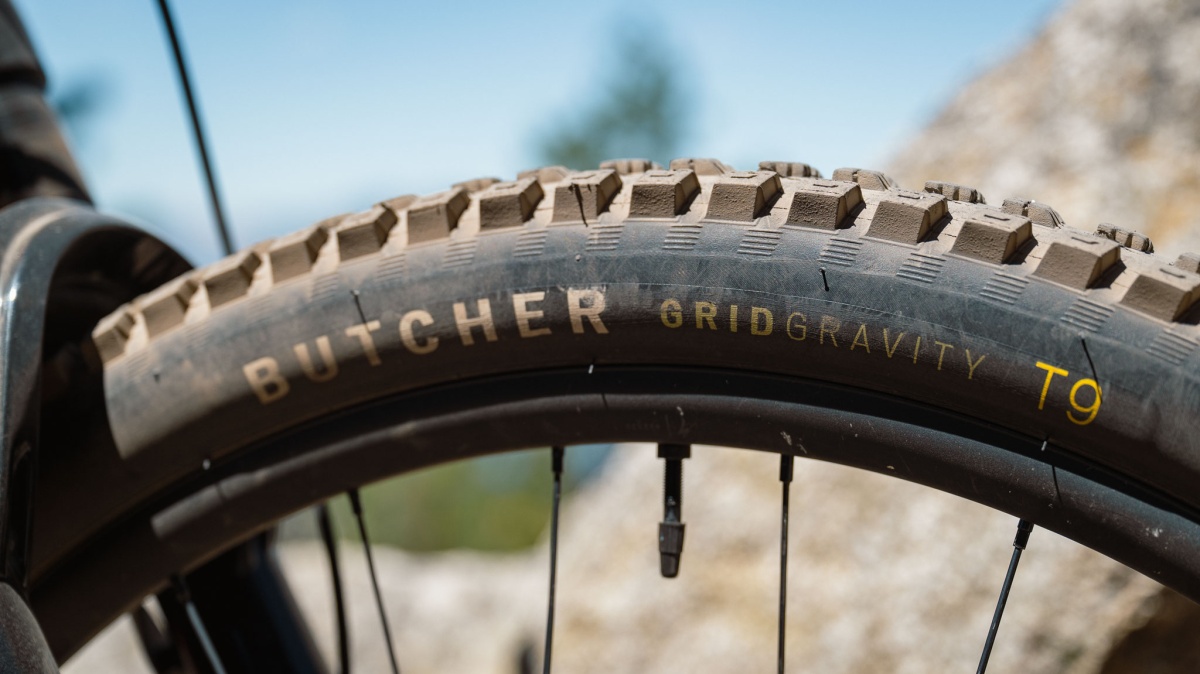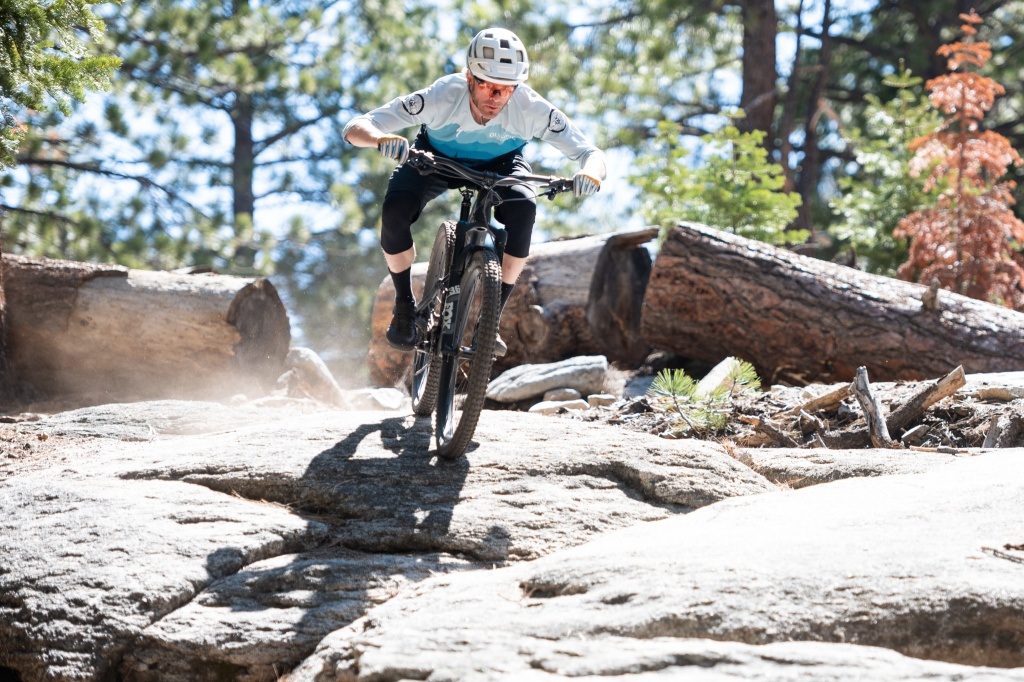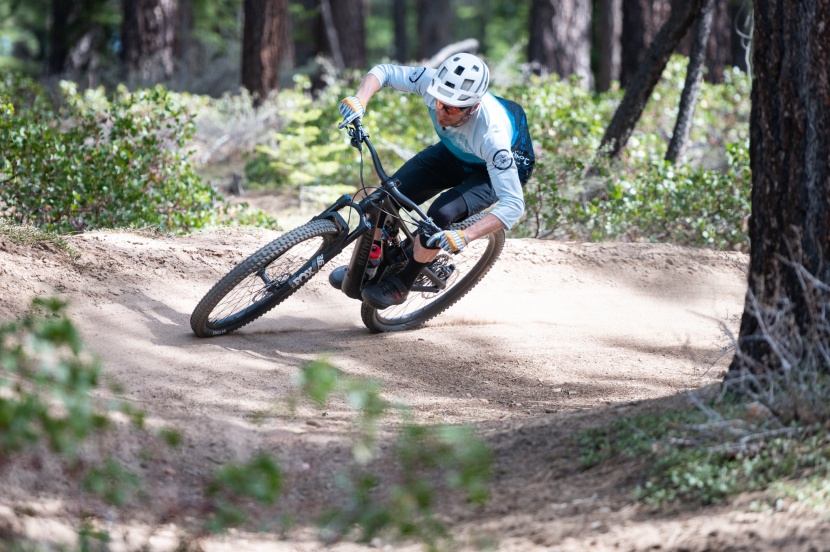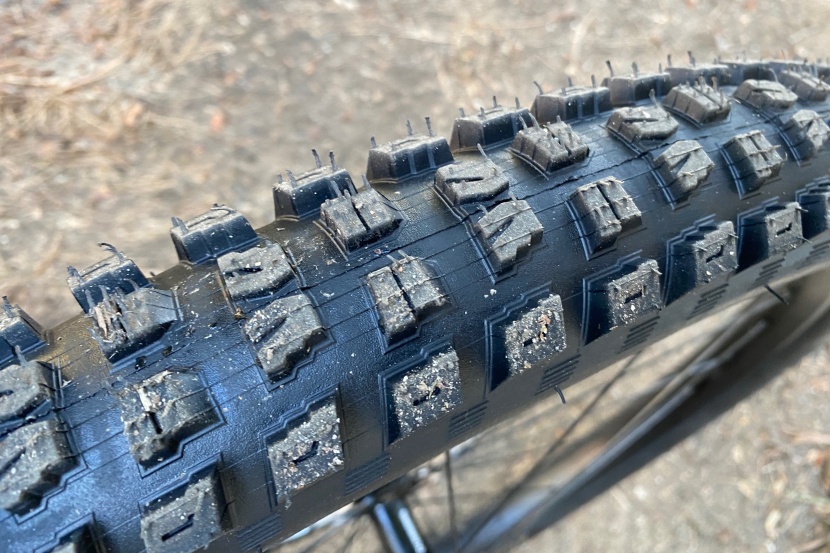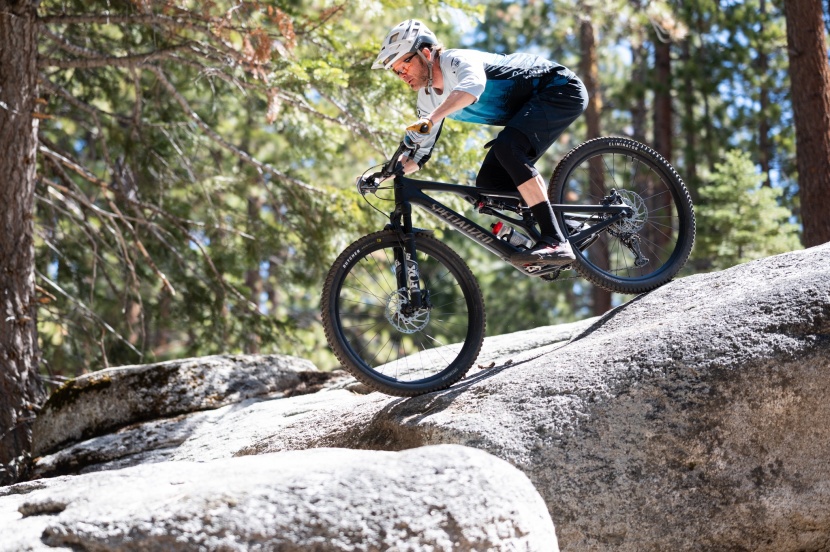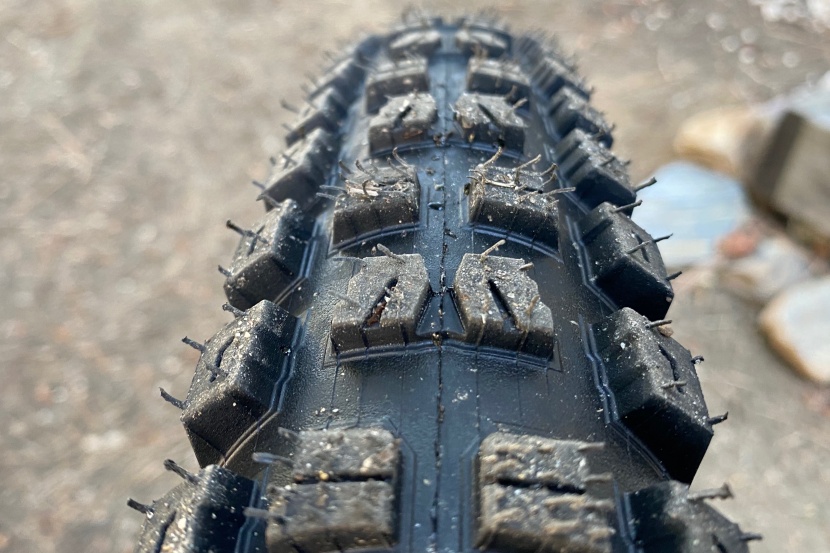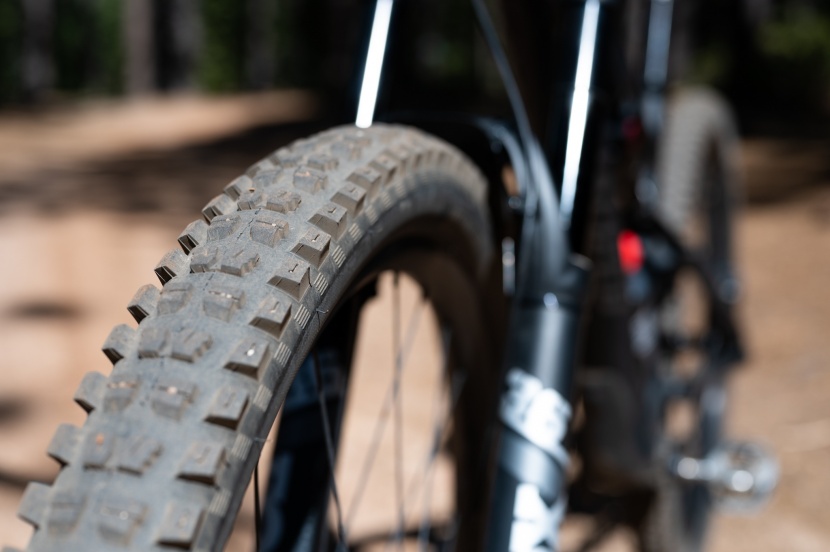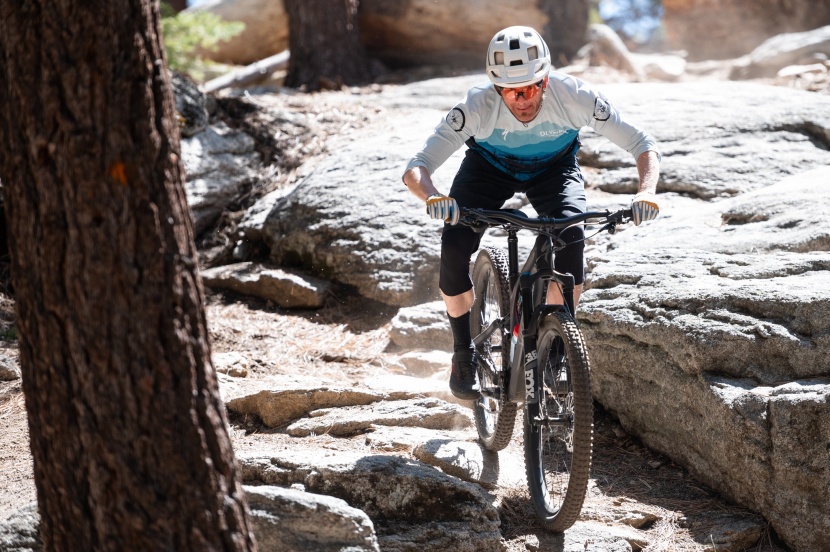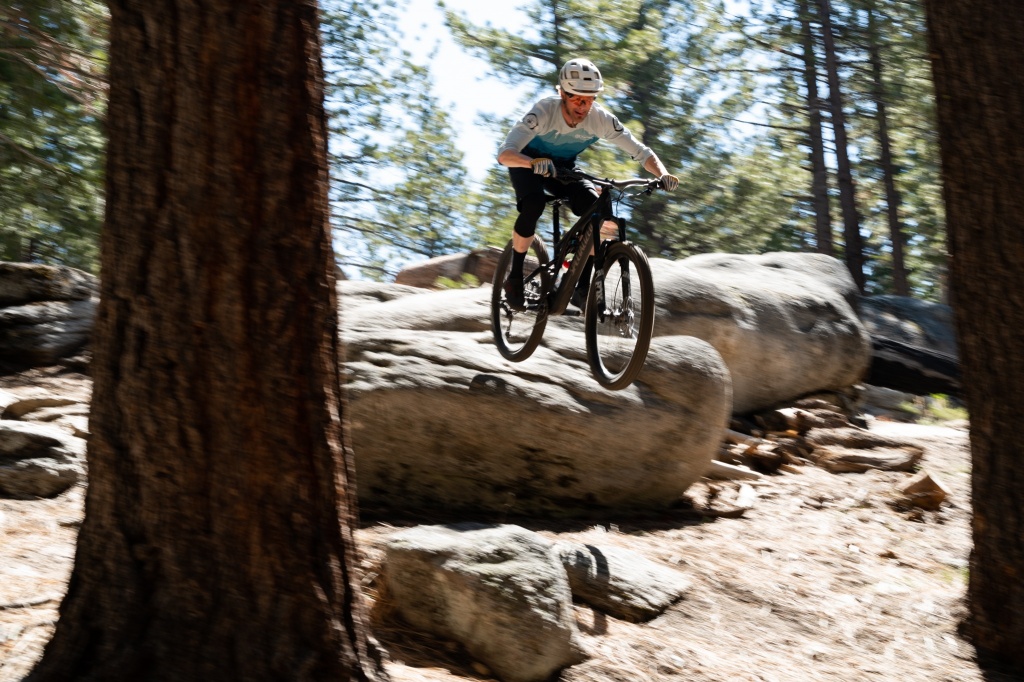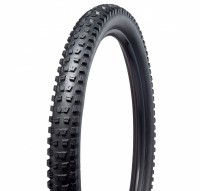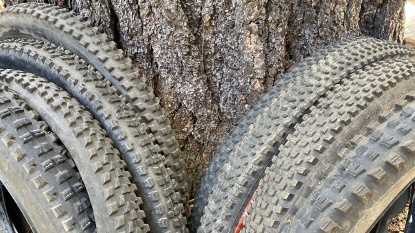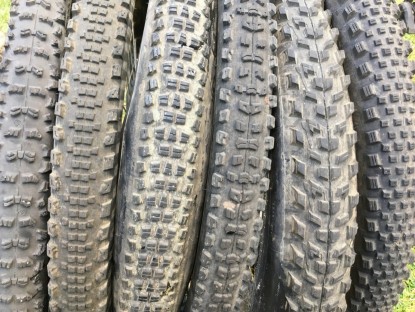Specialized Butcher GRID Trail T9 Review

Our Verdict
Our Analysis and Test Results
The Butcher is a long-standing model in Specialized's line of mountain bike tires. This popular trail riding tire has been tweaked slightly over the years, and the newest version features the new T9 rubber compound. Specialized's new rubber compounds range on a “T” scale from 5-9, with higher numbers providing a higher level of damping and grip. So, T9 is on the high-end of that scale, and Specialized says, “it is formulated for maximum adhesion on all surfaces, without being too soft or squishy and sacrificing ride feel.” We tested the new Butcher in the Grid Trail casing in both 2.3 and 2.6-inch widths. While it isn't a dramatic departure from the previous version, we found its traction and well-damped ride feel to be an improvement. This tire is available in 27.5 and 29-inch diameters in 2.3 and 2.6-inch widths (our 2.3" measured 2.4" and our 2.6" measured just over 2.5"). The 2.6-inch also has a slightly rounder profile and is significantly larger with more air volume. They also sell it in a Soil Searching tan-wall with some of the proceeds going towards trail projects.
Cornering
The Butcher has always been pretty good in the corners, but the new T9 rubber has only improved its performance. The aggressive, open tread pattern, sturdy cornering knobs, and slow rebound rubber combine to give it a super damp, glued-to-the-ground feel that hooks up and holds well in most conditions. It feels a little out of place on super hard-packed dirt but excels on virtually any other surface from granite slabs, loam, and blown-out dusty corners.
At first, nothing really stood out about the Butcher T9 in the corners. After riding a few miles, however, we noticed how little we had lost traction and just how effortlessly and calmly we seemed to be attacking seriously aggressive terrain. Of course, as has been the case for years, the Butcher's aggressive tread and open spacing do a great job of clawing into and grabbing on a big variety of trail surfaces, and the large row of side knobs provide a nice edge to lean on into corners. The tread pattern looks like it hasn't changed since the last update, with a Maxxis Minion DHF-esque design that simply works well. The center tread of the Butcher extends just slightly into the intermediate zone, and each knob is siped with every other side and center tread featuring sawtooth-shaped edges for additional bite. Transitions from the center tread to side knobs feel nice and smooth and it performs well at lean angles from moderate to aggressive. The sidewalls offer balanced support without feeling overly stiff or too flimsy. We found that 20-22 psi in the front was a good pressure to maximise the contact patch, but anything below that and the sidewalls started to feel squirmy and increased the likelihood of burping when pushed super hard in a corner.
Shortly into testing, we noticed how calm our bike felt and how little feedback seemed to be translated from the trail. Specialized makes lots of claims about the new T9 compound, particularly that the slow rebound improves high-frequency damping and sticks to the ground better. We found that it is somewhat subtle at first, but that it really gives this tire a noticeably damp, muted, and super smooth quality. Unlike many tires that use super-soft, tacky rubber that provides insane levels of grip but wears out in two weeks, the T9 rubber seems to improve cornering traction from a combination of relatively tacky rubber and enhanced dampening. That's not to say that the rubber isn't grippy, it's not ultra-soft but it is still pretty grippy, there's just more to it than that. Once we realized how these tires were working for us and rode them back to back with other models, the super damp nature of these tires really became apparent.
Pedaling Traction
Given the aggressive, open tread design of the Butcher T9, there is no lack of pedaling traction. This tire hooks up well on most surfaces and claws its way up loose, chunky climbs, and even wet conditions. There's a tradeoff in rolling resistance for its impressive grip, so we don't think this is the best choice if you value efficiency over traction or ride in mostly firm, smooth conditions. We rode with a 2.6" in front and a 2.3" in the rear, as well as an Eliminator Grid Trail T7 as a rear tire.
For much the same reasons this tire excels in the corners and when braking, the Butcher T9 serves up lots of traction when climbing. The wide spacing of the tall center tread allows each knob to dig in independently in loose conditions. At the same time, the sharp edges of the knobs and the relatively grippy rubber compound effectively grab onto the edges of rocks and firm surfaces alike. The slow rebounding rubber also feels super damp, and it doesn't tend to bounce or deflect off rocks or other imperfections in the trail surface. It does feel like there's a tiny bit of drag, but they really stand out in loose conditions for the traction they provide.
Braking Traction
The Butcher T9 has lots of braking traction. Whether used in the front, back or both, the tall, sharp-edged tread blocks with open spacing and relatively grippy, slow rebounding rubber dig into and grab hold of a wide range of surface conditions. Slowing and stopping is confidence-inspiring and predictable, allowing you to ride fast knowing that you can shut it down.
The tread pattern of the Butcher T9 does most of the heavy lifting when the brakes are applied. The tread knobs are tall with open spacing and sharp, vertical braking edges that do a great job of biting into loose conditions and slowing you down in a predictable manner. The T9 compound feels grippy on firm dirt and rock slabs, and the siping on all of the tread knobs help them conform to the surface. The slow rebound rubber also feels well connected, so it maintains contact when the brakes are applied, even over high-frequency chatter. A select few tires, like the Maxxis Assegai and the WTB Vigilante feel like they have slightly better braking traction, but the Butcher isn't far behind.
Rolling Resistance
One place the new T9 compound and aggressive tread pattern don't really do the Butcher and favors is in the rolling resistance department. These tires do feel a little draggy and sluggish when ridden uphill or back to back with faster rolling tires. They aren't egregiously slow-rolling or anything, in fact, they make a lot less noise than a brand new DHF when ridden on pavement, and they feel a little faster than that tire as well. While they do have more rolling resistance on the climbs and in the flats than less aggressive tires, we think it's pretty reasonable considering the weight, chunky tread, and increased traction.
On the descents, these tires don't feel slow at all, in fact, they provide such good grip and a damp ride feel that we felt confident letting it run in spots where we'd often be checking our speed. In the flats and on the climbs, however, we really felt a touch slower than usual. The aggressive tread, open spacing, and rubber compound combine to create a little more resistance, and the 1,123-gram weight of our 29" x 2.6" (29" x 2.3" weighed in at 1,095-grams) test tire probably didn't help much either. It should be noted that those weights are 73 and 120-grams heavier respectively than Specialized's claimed weights. We tested this tire both front and rear, and while it is a great rear tire for tackling aggressive descents, we really preferred it in the front with something a bit faster rolling in the rear. Specialized specs some of their bikes with the Eliminator T7 in the back, and we found that combo to be great. The Eliminator is a well-rounded rear tire, and while it isn't the fastest rolling, the T7 compound feels a bit firmer and longer-lasting and it pairs well with the Butcher for aggressive riding.
Longevity
Given the amount of grip the Butcher T9 has, we assumed it would be relatively fast wearing and the side knobs would pretty much be destroyed by the end of our test period. We were surprised to find that wasn't the case, and our test tire was still looking pretty fresh after several hundred miles of use. While grippy, the T9 rubber compound isn't as soft and tacky as some other brands, and that results in even wear and a longer tread life than you might expect given this tire's connection with the ground. Sure, the insides of the cornering knobs are beginning to show some erosion, but there are no chunks taken out or tearing of knobs. As with any rear tire, our 2.3" Butcher wore a fair amount faster on the back of the bike, but certainly not abnormally fast.
The Grid Trail casing has also proven to be quite robust for us during testing. This casing sits between the lighter-weight Grid and the burlier Grid Gravity, providing support and protection for aggressive trail riding. Specialized has basically added an additional layer of bead to bead protection which they claim has “increased its pinch flat protection by 15% and puncture protection by 30%.” While testing, we didn't get any flats from pinches, punctures, or sidewall tears despite playing around with low pressures and rimming out numerous times. We'd say the support and protection offered feels a lot like Maxxis EXO or even EXO+, where it's good enough for most riders most of the time, but super aggressive riders will likely find ways to punch holes in them pretty quickly.
Installation
Installing the Butcher Grid Trail T9 was generally pretty easy. The bead is snug to the rim, but skilled tire installers should be able to get it on without the need for tire levers. Once on the rim, we found that it wasn't so snug that we could inflate it with a standard floor pump, but one blast with the booster pump and we had the bead seated in no time.
Value
Specialized tires are always a great value and the Butcher Grid Trail T9 is no exception. These are some of the most affordable tires on the market at their retail price, and they perform right up there with some of the best in business. The new T9 compound has improved this tire's grip and dampening, and we feel it is an even better value than it used to be.
Conclusion
The new T9 rubber compound has taken Specialized's flagship aggressive tire, the Butcher, to a new level. This tire provides excellent cornering and braking traction, and now it feels notably more damp and glued to the ground than ever before. It's not the fastest rolling option, but it certainly delivers in the grip department without sacrificing durability. If you're an aggressive trail rider looking to improve the ride feel of your bike, we feel the Butcher T9 is an affordable way to do it.
Other Versions
The Butcher Grid Trail T9 we tested falls in the middle of the three versions of Butcher tire in Specialized's line.
The Butcher Grid T7 has a lighter casing with added sidewall protection, a firmer T7 rubber compound, and a slightly lighter weight. It comes in 29-inch diameters in 2.3" and 2.6" widths.
The beefy Butcher Grid Gravity T9 is the gravity version with a sturdy 2-ply construction and the grippy T9 rubber compound. The added protection increases the weight of this version compared to the Grid Trail we tested, and the retail price also bumps up by $10.| Awards | Best Bang for the Buck Front Tire |
|---|---|
| Price | $80 List Check Price at Backcountry |
Overall Score  |
|
| Star Rating | |
| Bottom Line | Specialized's classic aggressive trail riding tire with a new rubber compound, enhanced grip, and same great value |
| Pros | Great cornering grip, good braking traction, aggressive tread pattern, super damp ride quality, available in 2.6 and 2.3-inch widths |
| Cons | Moderate weight, not the fastest rolling |
| Rating Categories | Specialized Butcher... |
| Cornering (25%) | |
| Pedaling Traction (20%) | |
| Braking Traction (20%) | |
| Rolling Resistance (15%) | |
| Longevity (15%) | |
| Installation (5%) | |
| Specifications | Specialized Butcher... |
| Size tested | 29" x 2.6" |
| Weight as tested | 1123g |
| Front, Rear, or Both | Front, Both |
| Casing Tested | GRID Trail |
| Compound Tested | Gripton T9 |
| Bead | Folding |
| Tread Count (TPI) | 60 |


